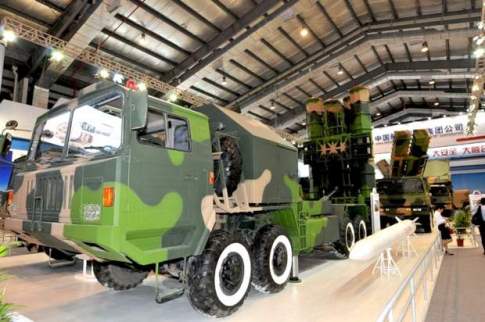There is increasing speculation that Turkey may cancel its highly controversial project to build long-range air and missile defense systems (T-Loramids) with the China Precision Machinery Import-Export Corporation (CPMIEC) - which is under US sanctions - as pressure has mounted on the NATO-member country not to go ahead with a non-NATO system that will not be interoperable with the alliance's air defense network, Today's Zaman reported.
Well-informed sources in Ankara told Today's Zaman that Turkey is expected to spend a few more months in contract talks with China before canceling the project entirely.
"Turkey will not immediately cancel the project but will instead build a case to cancel the project entirely. Turkey has been told by NATO from the very beginning of its selection of CPMIEC that the Chinese system will not be operable with the alliance air defense network," a source said.
In the meantime, Turkey has been continuing contract negotiations with CPMIEC to co-produce long-range missiles based on China's HQ-9 systems.
A defense industry source earlier told Today's Zaman that the results of the ongoing preliminary talks with China are to be submitted to Prime Minister Recep Tayyip Erdoğan for evaluation later this month.
NATO, the US and a few other countries have continued to put pressure on Turkey over its September selection of CMPIEC's HQ-9 missile systems over rival offers from Franco-Italian Eurosam's SAMP/T and US firm Lockheed Martin and Raytheon's PAC-3, citing the interoperability as well security problems that will occur between HQ-9 and the NATO air defense systems.
Ankara says CPMIEC's $3.4 billion high technology offer, that it believes will enable Turkey to coproduce the missiles and thus build a strong national defense industry, played a critical role in the Turkish selection of China. Turkey says it will begin contract talks with other foreign bidders -- second runner Eurosam and the third runner LM/Raytheon -- in the tender if negotiations with the Chinese company fail.
However, Turkey has begun to feel the heat over its selection of a Chinese system.
Bank of America Merrill Lynch dropped its bid to broker the public offering of Turkey's military electronics company ASELSAN on the grounds that NATO-member Turkey is holding negotiations with CPMIEC.
CPMIEC is under US sanctions for selling items to Iran, Syria and North Korea that are banned under US law to curb the proliferation of weapons of mass destruction.
US sources in Ankara earlier told the local media that US companies will find it hard to cooperate with some Turkish defense companies due to the Turkish selection of Chinese missiles and concerns that some confidential information in their dealings with the Turkish companies may fall into the hands of CPMIEC.






